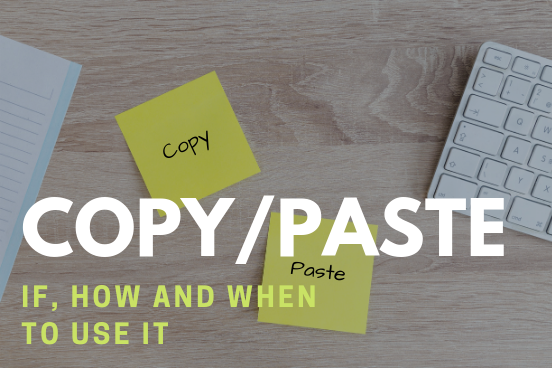
We’ve discussed copy and paste many times in this blog, so it’s about time we tackle the issue head on and discuss exactly if, how and when you should use copy and paste in your bid writing.
If.
As a general rule, it’s best not to use copy and paste at all if you can avoid it. However this is obviously a little unrealistic.
Copy and pasting small sections of information can be a useful way to help save time in what can often be a very lengthy bidding process. It is important however that you don’t overdo it. Bids which simply copy large chunks of boilerplate or marketing text rarely succeed as they are not formulated towards any specific opportunity.
Each bid you write must be unique. Focus on how you will support a specific buying authority, with a specific solution, based around their specific requirements. No amount of copy and paste can accurately describe this.
You must be selective with the information that you copy into your proposal. Carefully tailor every word afterwards, to ensure that it remains relevant and adds value. If it doesn’t add value, don’t put it in.
How.
Before deciding to take the copy and paste route, you must be VERY careful. If you can, avoid it, but if you must, consider these points:
Does it answer the question?
If you copy large chunks of information from brochures or previous bids, it is highly unlikely to be directly relevant to the question being asked. We would advise only copying small sections at a time and reading them, along with the marking criteria before moving on. Make sure every word is relevant and answers the question.
Is it relevant to the contract requirements?
Similar to the above, make sure that the often highly generic pieces of information that you copy in are supplemented by freshly written sections which directly address the contract and its requirements. Don’t simply express what you ‘do’ or ‘have done’. Instead, discuss what you are actively planning to do if you are awarded the contract.
Have you removed all details of previous bids or clients?
The most important thing when copy and pasting is that you be very careful. Read every word carefully and make sure to remove any information which shouldn’t be there. Old contract or service information could be very bad news for your bidding prospects and leaving in an old client name is a sure-fire way to make sure your proposal ends up in the bin.
When.
We generally recommend that you only apply copy and paste to the most common bid questions you see. Your social value offering for example, will most probably vary very little from bid to bid. There may therefore be time to save here by incorporating a well refined piece of high-quality content instead.
You most certainly should not use copy and paste on very bid-specific sections such as your solution offering, method statements or mobilisation plans. You may have some content on your general processes here, however without going into detail about the specific bid in hand, you are highly unlikely to be successful.
Did you enjoy this post?
Click Here to learn more about the benefits of a full Bid Library.
Follow Bespoke Bids on Linkedin to keep up with our day-to-day operations. We post live tenders, tips and tricks and more.


